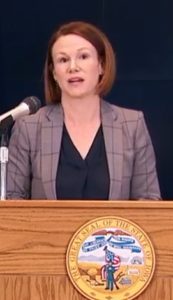
Iowa Department of Human Services director Kelly Garcia highlighted what she called “the human side of our state’s response” to the COVID-19 pandemic at Gov Kim Reynolds’ daily press briefing April 15.
“At a time when it’s critical that Iowans stay home… we must also recognize that home is not a safe place for all Iowans…. Data from past disasters show physical and sexual abuse, as well as domestic violence and substance abuse increases along with the stress on families in these types of circumstances,” Reynolds said before introducing Garcia.
“Stressors are a part of everyday life, but our inability in this emergency to access our normal social supports in the way we are used to makes things feel harder,” Garcia said. “Under the best of circumstances, parenting can be a daily challenge. While many are taking this time to add precious memories at home, we recognized not everyone can do that….We know many Iowans live paycheck to paycheck… We need to support these families and those individuals who live in the margins.”
In response to the pandemic, DHS has removed barriers to medical and food assistance. Premiums and copays have been suspended, telehealth has been expanded, and work is in progress to provide COVID testing for the uninsured.
DHS has also expanded behavioral health support.
Garcia said reports of abuse have dropped, causing DHS staff concern. “We don’t believe abuse has gone away, but the reports have. Teachers, doctors, and other mandatory reporters are not seeing children and vulnerable adults like they normally would, and this is concerning,” she said.
She said DHS is “putting out the call to communities, to neighbors, faith-based organizations and all Iowans: If you hear something or see something, say something…. We all have our part to play in this response, so we’re calling on you. Pay attention to the sounds in your neighborhood. Reach out to the children and vulnerable adults in your life by phone or video call. Make sure they know that they’re loved and supported. If you believe someone is in imminent danger, call 9-1-1 immediately.”
During the Q & A portion of the press briefing, Reynolds was asked what the state is doing to address the disproportionate number of black and Latino Iowans who are testing positive for COVID-19. That information was provided yesterday with the updated coronavirus.iowa.gov website.
Reynolds turned to Iowa Department of Public Health deputy director Sarah Reisetter for the answer. Reisetter said the numbers are consistent with the rest of the country, that blacks and Latinos statistically have a higher incidence of underlying medical conditions, tend to work in businesses that are not closed, and generally live in more dense house situations.
In answering another question Reynolds again hinted mitigation steps might be eased in northwest Iowa before the rest of the state. She again declined to say whether she’ll extend school closures past April 30. She has promised to give school districts two weeks’ notice. That would call for an announcement Thursday, April 16.
Tallying numbers, IDPH was notified of 96 additional positive COVID-19 in the 24 hours preceding April 14 at 10 am. The total number of positive cases stands at 1,995. There have been additional 407 negative tests for a total of 17,874 negative tests to date, which includes testing reported by the State Hygienic Lab and other labs. Another outbreak in a long term care facility was reported, this one in Muscatine County.
According to IDPH, 171 Iowans are hospitalized and 908 Iowans have recovered. Four persons died: adults age 61-80 in Allamakee and Johnson counties, and seniors age 81 or older in Clayton and Polk counties.
The new dashboard for the “Current Status” tab on coronavirus.iowa.gov provides detailed information for the state, regions and counties. The site is updated daily and includes Iowa’s epidemiological curve.
